Otago Polytechnic Report: Zero Carbon Bill and Partnerships
VerifiedAdded on 2022/08/12
|25
|6249
|311
Report
AI Summary
This report examines the Zero Carbon Bill and its implications for New Zealand, focusing on the role of polytechnic working partnerships in achieving carbon emission reduction goals and environmental sustainability. The report investigates how these partnerships, including collaborations with iwi, hapu, hāpori, and Māori researchers, can improve outcomes for learners, communities, and various stakeholders. It analyzes the organizational responses to climate change mitigation, including the use of innovative models and approaches, and discusses the contribution of these partnerships towards future learning organizations. The report also addresses the challenges and issues related to climate change, such as increased carbon emissions and the failure of previous mitigation efforts, and proposes collaborative development of adaptive systems to improve learner outcomes. Furthermore, it highlights the valued outcomes for stakeholders, the importance of government intervention, and the promotion of successful learning environments within the context of the Zero Carbon Bill. The report emphasizes the significance of applied research in solving problems, demonstrating collaboration, and creating value for stakeholders in line with the bill's objectives.
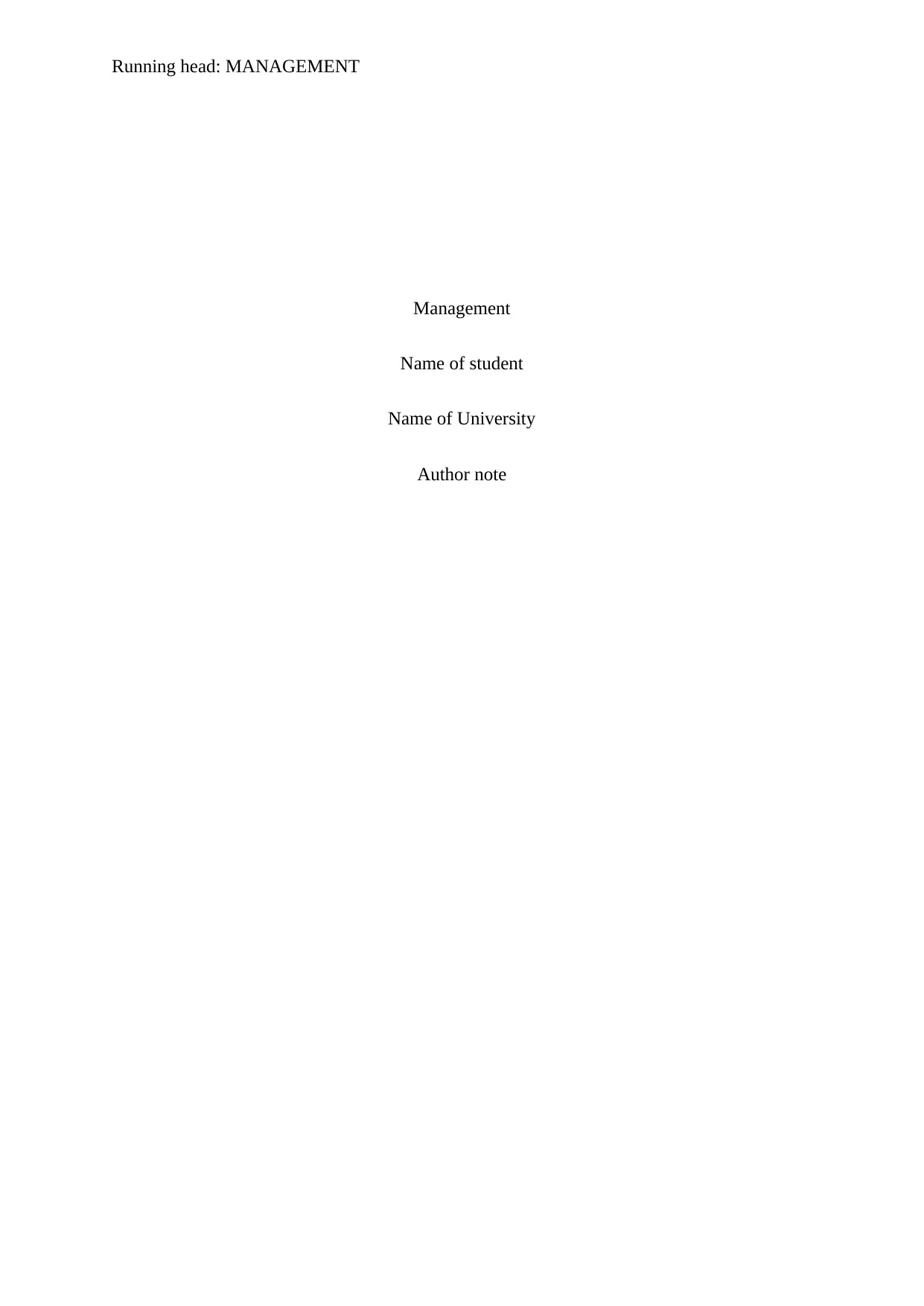
Running head: MANAGEMENT
Management
Name of student
Name of University
Author note
Management
Name of student
Name of University
Author note
Paraphrase This Document
Need a fresh take? Get an instant paraphrase of this document with our AI Paraphraser
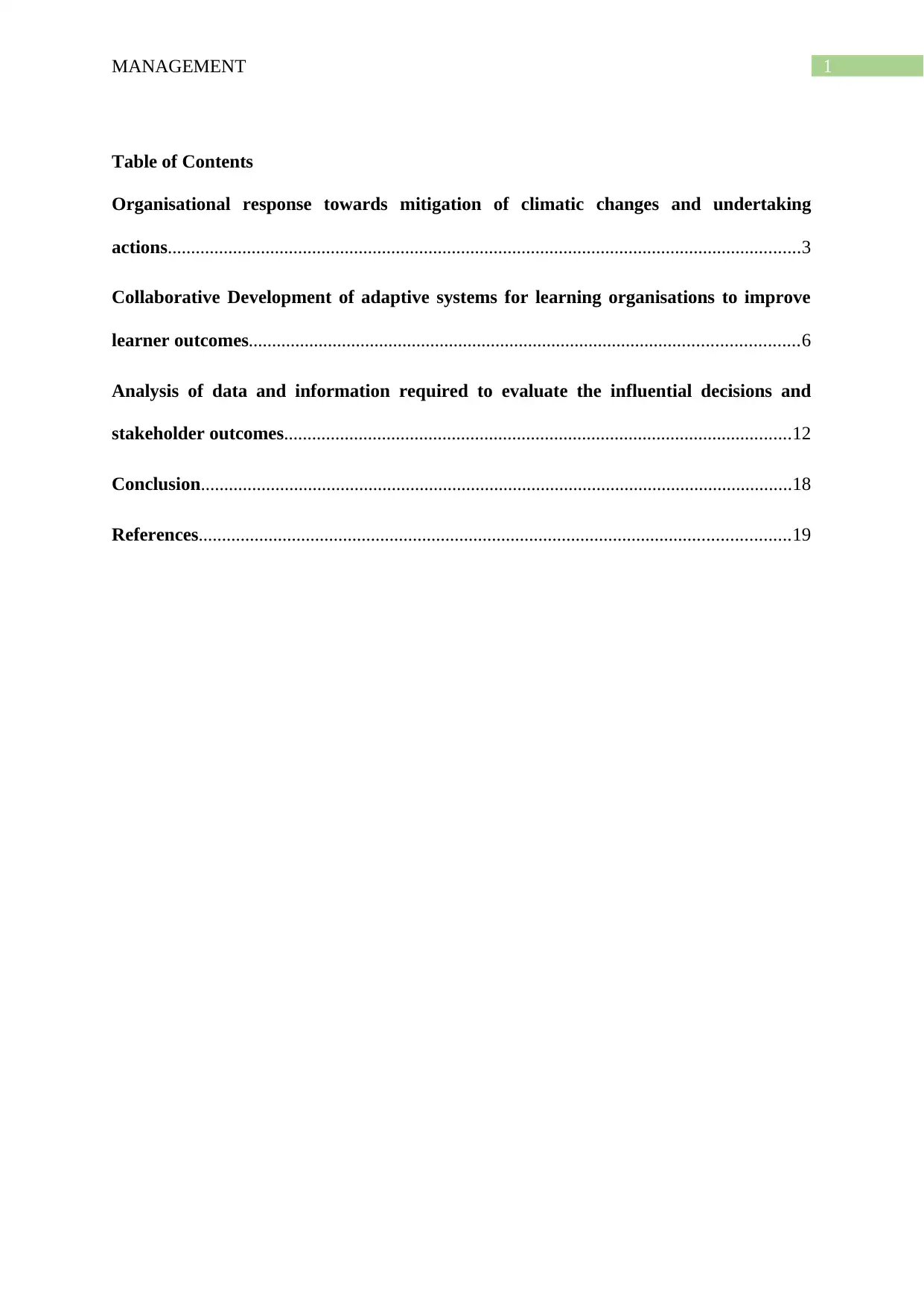
1MANAGEMENT
Table of Contents
Organisational response towards mitigation of climatic changes and undertaking
actions........................................................................................................................................3
Collaborative Development of adaptive systems for learning organisations to improve
learner outcomes......................................................................................................................6
Analysis of data and information required to evaluate the influential decisions and
stakeholder outcomes.............................................................................................................12
Conclusion...............................................................................................................................18
References...............................................................................................................................19
Table of Contents
Organisational response towards mitigation of climatic changes and undertaking
actions........................................................................................................................................3
Collaborative Development of adaptive systems for learning organisations to improve
learner outcomes......................................................................................................................6
Analysis of data and information required to evaluate the influential decisions and
stakeholder outcomes.............................................................................................................12
Conclusion...............................................................................................................................18
References...............................................................................................................................19
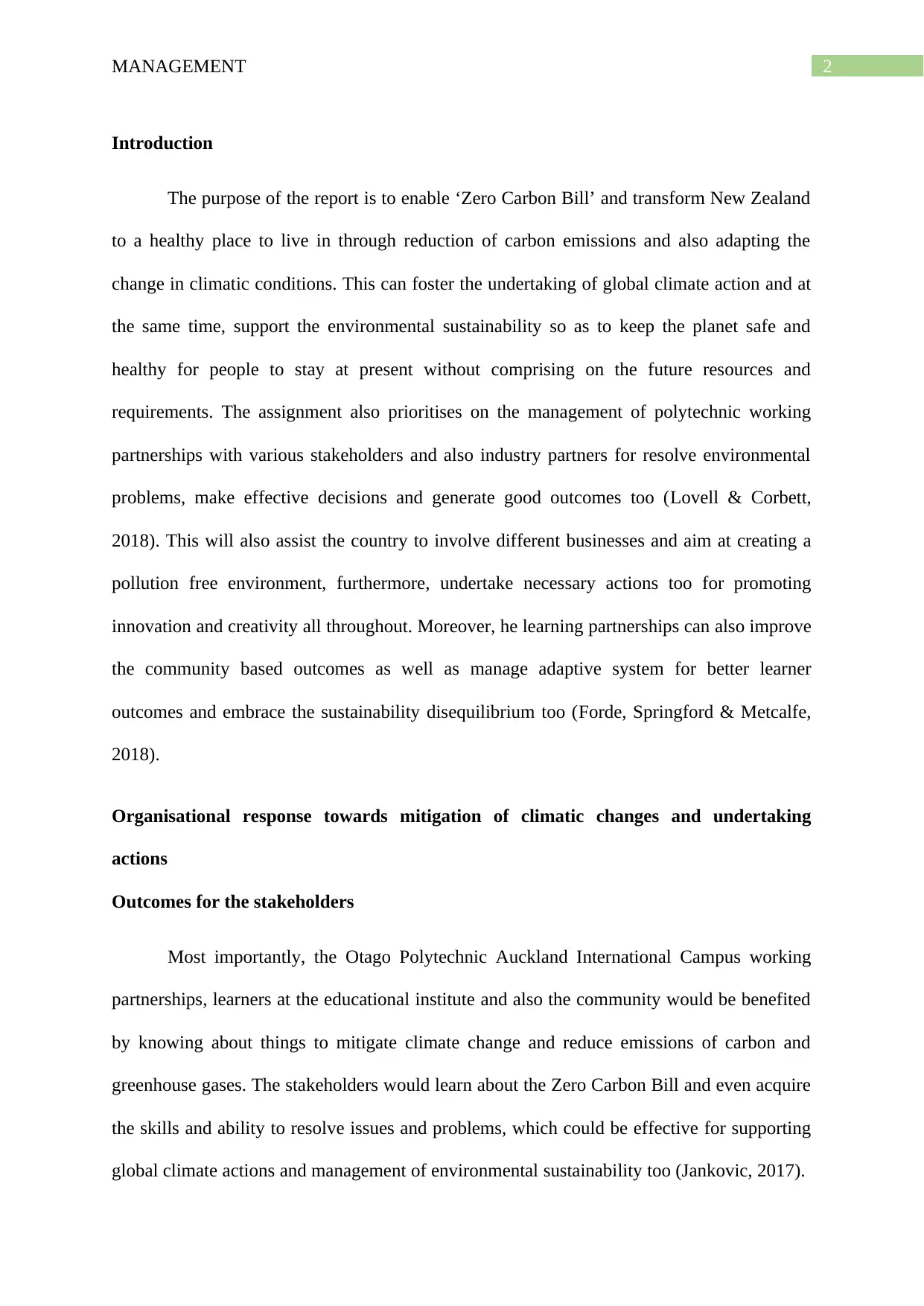
2MANAGEMENT
Introduction
The purpose of the report is to enable ‘Zero Carbon Bill’ and transform New Zealand
to a healthy place to live in through reduction of carbon emissions and also adapting the
change in climatic conditions. This can foster the undertaking of global climate action and at
the same time, support the environmental sustainability so as to keep the planet safe and
healthy for people to stay at present without comprising on the future resources and
requirements. The assignment also prioritises on the management of polytechnic working
partnerships with various stakeholders and also industry partners for resolve environmental
problems, make effective decisions and generate good outcomes too (Lovell & Corbett,
2018). This will also assist the country to involve different businesses and aim at creating a
pollution free environment, furthermore, undertake necessary actions too for promoting
innovation and creativity all throughout. Moreover, he learning partnerships can also improve
the community based outcomes as well as manage adaptive system for better learner
outcomes and embrace the sustainability disequilibrium too (Forde, Springford & Metcalfe,
2018).
Organisational response towards mitigation of climatic changes and undertaking
actions
Outcomes for the stakeholders
Most importantly, the Otago Polytechnic Auckland International Campus working
partnerships, learners at the educational institute and also the community would be benefited
by knowing about things to mitigate climate change and reduce emissions of carbon and
greenhouse gases. The stakeholders would learn about the Zero Carbon Bill and even acquire
the skills and ability to resolve issues and problems, which could be effective for supporting
global climate actions and management of environmental sustainability too (Jankovic, 2017).
Introduction
The purpose of the report is to enable ‘Zero Carbon Bill’ and transform New Zealand
to a healthy place to live in through reduction of carbon emissions and also adapting the
change in climatic conditions. This can foster the undertaking of global climate action and at
the same time, support the environmental sustainability so as to keep the planet safe and
healthy for people to stay at present without comprising on the future resources and
requirements. The assignment also prioritises on the management of polytechnic working
partnerships with various stakeholders and also industry partners for resolve environmental
problems, make effective decisions and generate good outcomes too (Lovell & Corbett,
2018). This will also assist the country to involve different businesses and aim at creating a
pollution free environment, furthermore, undertake necessary actions too for promoting
innovation and creativity all throughout. Moreover, he learning partnerships can also improve
the community based outcomes as well as manage adaptive system for better learner
outcomes and embrace the sustainability disequilibrium too (Forde, Springford & Metcalfe,
2018).
Organisational response towards mitigation of climatic changes and undertaking
actions
Outcomes for the stakeholders
Most importantly, the Otago Polytechnic Auckland International Campus working
partnerships, learners at the educational institute and also the community would be benefited
by knowing about things to mitigate climate change and reduce emissions of carbon and
greenhouse gases. The stakeholders would learn about the Zero Carbon Bill and even acquire
the skills and ability to resolve issues and problems, which could be effective for supporting
global climate actions and management of environmental sustainability too (Jankovic, 2017).
⊘ This is a preview!⊘
Do you want full access?
Subscribe today to unlock all pages.

Trusted by 1+ million students worldwide
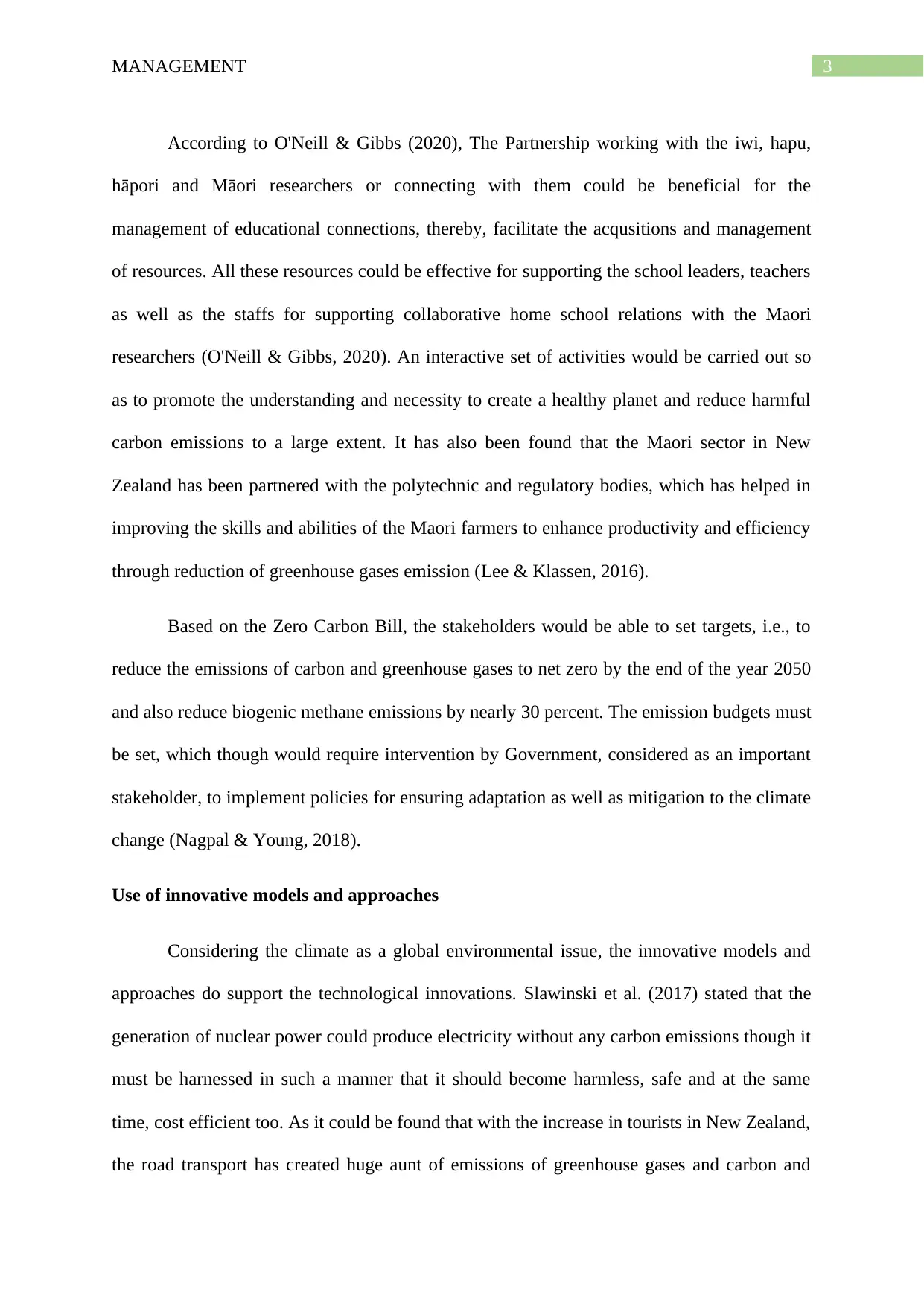
3MANAGEMENT
According to O'Neill & Gibbs (2020), The Partnership working with the iwi, hapu,
hāpori and Māori researchers or connecting with them could be beneficial for the
management of educational connections, thereby, facilitate the acqusitions and management
of resources. All these resources could be effective for supporting the school leaders, teachers
as well as the staffs for supporting collaborative home school relations with the Maori
researchers (O'Neill & Gibbs, 2020). An interactive set of activities would be carried out so
as to promote the understanding and necessity to create a healthy planet and reduce harmful
carbon emissions to a large extent. It has also been found that the Maori sector in New
Zealand has been partnered with the polytechnic and regulatory bodies, which has helped in
improving the skills and abilities of the Maori farmers to enhance productivity and efficiency
through reduction of greenhouse gases emission (Lee & Klassen, 2016).
Based on the Zero Carbon Bill, the stakeholders would be able to set targets, i.e., to
reduce the emissions of carbon and greenhouse gases to net zero by the end of the year 2050
and also reduce biogenic methane emissions by nearly 30 percent. The emission budgets must
be set, which though would require intervention by Government, considered as an important
stakeholder, to implement policies for ensuring adaptation as well as mitigation to the climate
change (Nagpal & Young, 2018).
Use of innovative models and approaches
Considering the climate as a global environmental issue, the innovative models and
approaches do support the technological innovations. Slawinski et al. (2017) stated that the
generation of nuclear power could produce electricity without any carbon emissions though it
must be harnessed in such a manner that it should become harmless, safe and at the same
time, cost efficient too. As it could be found that with the increase in tourists in New Zealand,
the road transport has created huge aunt of emissions of greenhouse gases and carbon and
According to O'Neill & Gibbs (2020), The Partnership working with the iwi, hapu,
hāpori and Māori researchers or connecting with them could be beneficial for the
management of educational connections, thereby, facilitate the acqusitions and management
of resources. All these resources could be effective for supporting the school leaders, teachers
as well as the staffs for supporting collaborative home school relations with the Maori
researchers (O'Neill & Gibbs, 2020). An interactive set of activities would be carried out so
as to promote the understanding and necessity to create a healthy planet and reduce harmful
carbon emissions to a large extent. It has also been found that the Maori sector in New
Zealand has been partnered with the polytechnic and regulatory bodies, which has helped in
improving the skills and abilities of the Maori farmers to enhance productivity and efficiency
through reduction of greenhouse gases emission (Lee & Klassen, 2016).
Based on the Zero Carbon Bill, the stakeholders would be able to set targets, i.e., to
reduce the emissions of carbon and greenhouse gases to net zero by the end of the year 2050
and also reduce biogenic methane emissions by nearly 30 percent. The emission budgets must
be set, which though would require intervention by Government, considered as an important
stakeholder, to implement policies for ensuring adaptation as well as mitigation to the climate
change (Nagpal & Young, 2018).
Use of innovative models and approaches
Considering the climate as a global environmental issue, the innovative models and
approaches do support the technological innovations. Slawinski et al. (2017) stated that the
generation of nuclear power could produce electricity without any carbon emissions though it
must be harnessed in such a manner that it should become harmless, safe and at the same
time, cost efficient too. As it could be found that with the increase in tourists in New Zealand,
the road transport has created huge aunt of emissions of greenhouse gases and carbon and
Paraphrase This Document
Need a fresh take? Get an instant paraphrase of this document with our AI Paraphraser
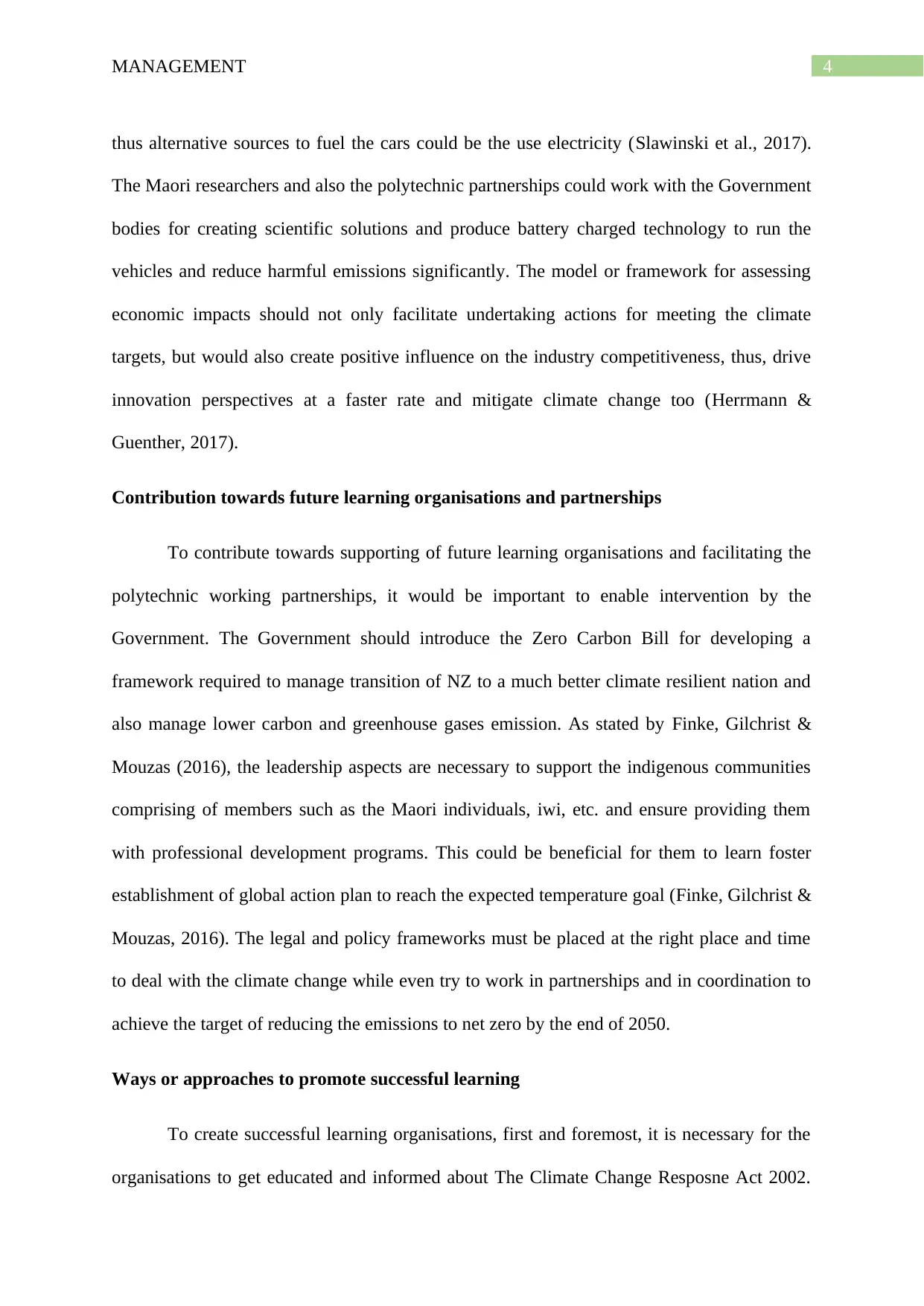
4MANAGEMENT
thus alternative sources to fuel the cars could be the use electricity (Slawinski et al., 2017).
The Maori researchers and also the polytechnic partnerships could work with the Government
bodies for creating scientific solutions and produce battery charged technology to run the
vehicles and reduce harmful emissions significantly. The model or framework for assessing
economic impacts should not only facilitate undertaking actions for meeting the climate
targets, but would also create positive influence on the industry competitiveness, thus, drive
innovation perspectives at a faster rate and mitigate climate change too (Herrmann &
Guenther, 2017).
Contribution towards future learning organisations and partnerships
To contribute towards supporting of future learning organisations and facilitating the
polytechnic working partnerships, it would be important to enable intervention by the
Government. The Government should introduce the Zero Carbon Bill for developing a
framework required to manage transition of NZ to a much better climate resilient nation and
also manage lower carbon and greenhouse gases emission. As stated by Finke, Gilchrist &
Mouzas (2016), the leadership aspects are necessary to support the indigenous communities
comprising of members such as the Maori individuals, iwi, etc. and ensure providing them
with professional development programs. This could be beneficial for them to learn foster
establishment of global action plan to reach the expected temperature goal (Finke, Gilchrist &
Mouzas, 2016). The legal and policy frameworks must be placed at the right place and time
to deal with the climate change while even try to work in partnerships and in coordination to
achieve the target of reducing the emissions to net zero by the end of 2050.
Ways or approaches to promote successful learning
To create successful learning organisations, first and foremost, it is necessary for the
organisations to get educated and informed about The Climate Change Resposne Act 2002.
thus alternative sources to fuel the cars could be the use electricity (Slawinski et al., 2017).
The Maori researchers and also the polytechnic partnerships could work with the Government
bodies for creating scientific solutions and produce battery charged technology to run the
vehicles and reduce harmful emissions significantly. The model or framework for assessing
economic impacts should not only facilitate undertaking actions for meeting the climate
targets, but would also create positive influence on the industry competitiveness, thus, drive
innovation perspectives at a faster rate and mitigate climate change too (Herrmann &
Guenther, 2017).
Contribution towards future learning organisations and partnerships
To contribute towards supporting of future learning organisations and facilitating the
polytechnic working partnerships, it would be important to enable intervention by the
Government. The Government should introduce the Zero Carbon Bill for developing a
framework required to manage transition of NZ to a much better climate resilient nation and
also manage lower carbon and greenhouse gases emission. As stated by Finke, Gilchrist &
Mouzas (2016), the leadership aspects are necessary to support the indigenous communities
comprising of members such as the Maori individuals, iwi, etc. and ensure providing them
with professional development programs. This could be beneficial for them to learn foster
establishment of global action plan to reach the expected temperature goal (Finke, Gilchrist &
Mouzas, 2016). The legal and policy frameworks must be placed at the right place and time
to deal with the climate change while even try to work in partnerships and in coordination to
achieve the target of reducing the emissions to net zero by the end of 2050.
Ways or approaches to promote successful learning
To create successful learning organisations, first and foremost, it is necessary for the
organisations to get educated and informed about The Climate Change Resposne Act 2002.
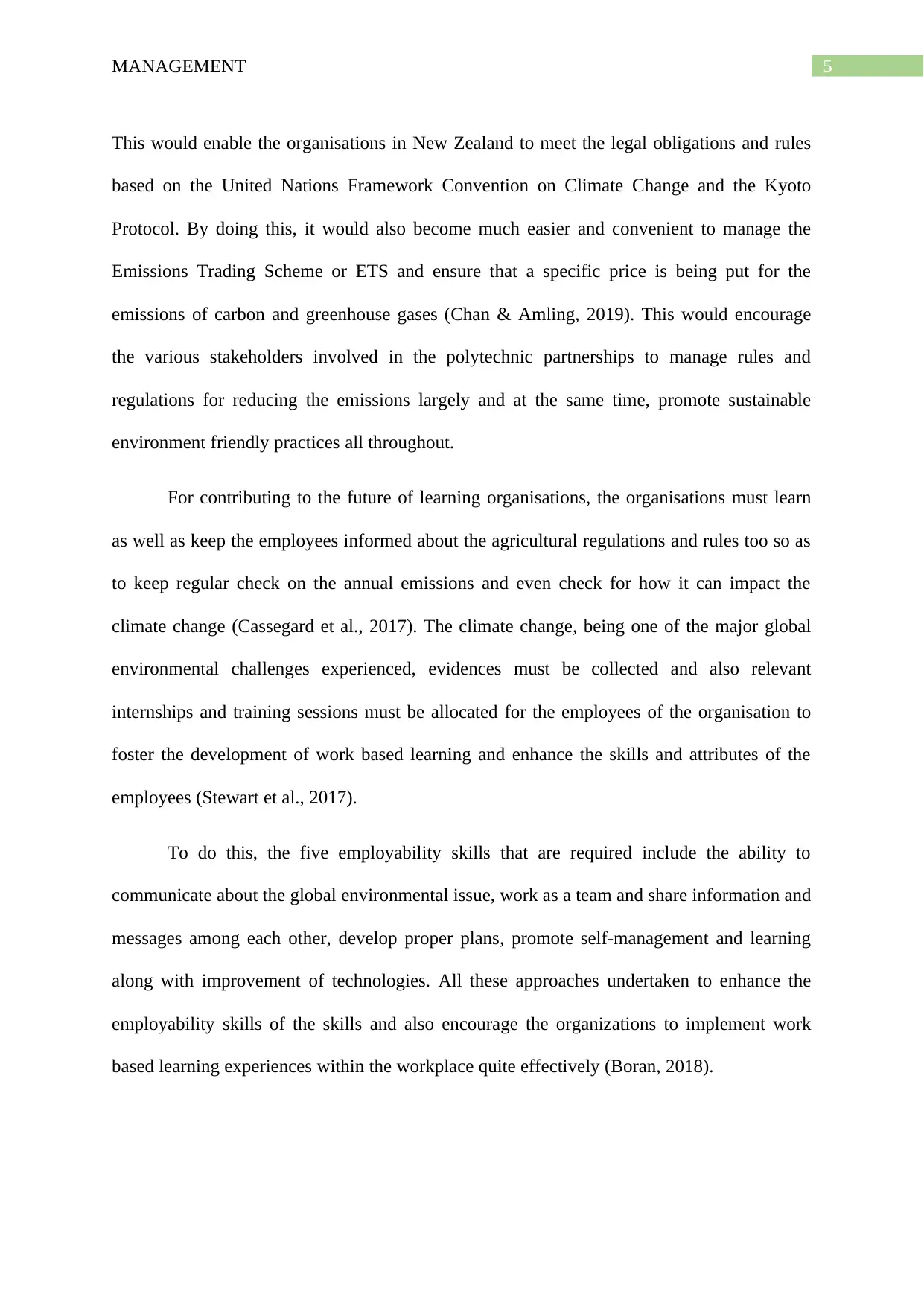
5MANAGEMENT
This would enable the organisations in New Zealand to meet the legal obligations and rules
based on the United Nations Framework Convention on Climate Change and the Kyoto
Protocol. By doing this, it would also become much easier and convenient to manage the
Emissions Trading Scheme or ETS and ensure that a specific price is being put for the
emissions of carbon and greenhouse gases (Chan & Amling, 2019). This would encourage
the various stakeholders involved in the polytechnic partnerships to manage rules and
regulations for reducing the emissions largely and at the same time, promote sustainable
environment friendly practices all throughout.
For contributing to the future of learning organisations, the organisations must learn
as well as keep the employees informed about the agricultural regulations and rules too so as
to keep regular check on the annual emissions and even check for how it can impact the
climate change (Cassegard et al., 2017). The climate change, being one of the major global
environmental challenges experienced, evidences must be collected and also relevant
internships and training sessions must be allocated for the employees of the organisation to
foster the development of work based learning and enhance the skills and attributes of the
employees (Stewart et al., 2017).
To do this, the five employability skills that are required include the ability to
communicate about the global environmental issue, work as a team and share information and
messages among each other, develop proper plans, promote self-management and learning
along with improvement of technologies. All these approaches undertaken to enhance the
employability skills of the skills and also encourage the organizations to implement work
based learning experiences within the workplace quite effectively (Boran, 2018).
This would enable the organisations in New Zealand to meet the legal obligations and rules
based on the United Nations Framework Convention on Climate Change and the Kyoto
Protocol. By doing this, it would also become much easier and convenient to manage the
Emissions Trading Scheme or ETS and ensure that a specific price is being put for the
emissions of carbon and greenhouse gases (Chan & Amling, 2019). This would encourage
the various stakeholders involved in the polytechnic partnerships to manage rules and
regulations for reducing the emissions largely and at the same time, promote sustainable
environment friendly practices all throughout.
For contributing to the future of learning organisations, the organisations must learn
as well as keep the employees informed about the agricultural regulations and rules too so as
to keep regular check on the annual emissions and even check for how it can impact the
climate change (Cassegard et al., 2017). The climate change, being one of the major global
environmental challenges experienced, evidences must be collected and also relevant
internships and training sessions must be allocated for the employees of the organisation to
foster the development of work based learning and enhance the skills and attributes of the
employees (Stewart et al., 2017).
To do this, the five employability skills that are required include the ability to
communicate about the global environmental issue, work as a team and share information and
messages among each other, develop proper plans, promote self-management and learning
along with improvement of technologies. All these approaches undertaken to enhance the
employability skills of the skills and also encourage the organizations to implement work
based learning experiences within the workplace quite effectively (Boran, 2018).
⊘ This is a preview!⊘
Do you want full access?
Subscribe today to unlock all pages.

Trusted by 1+ million students worldwide
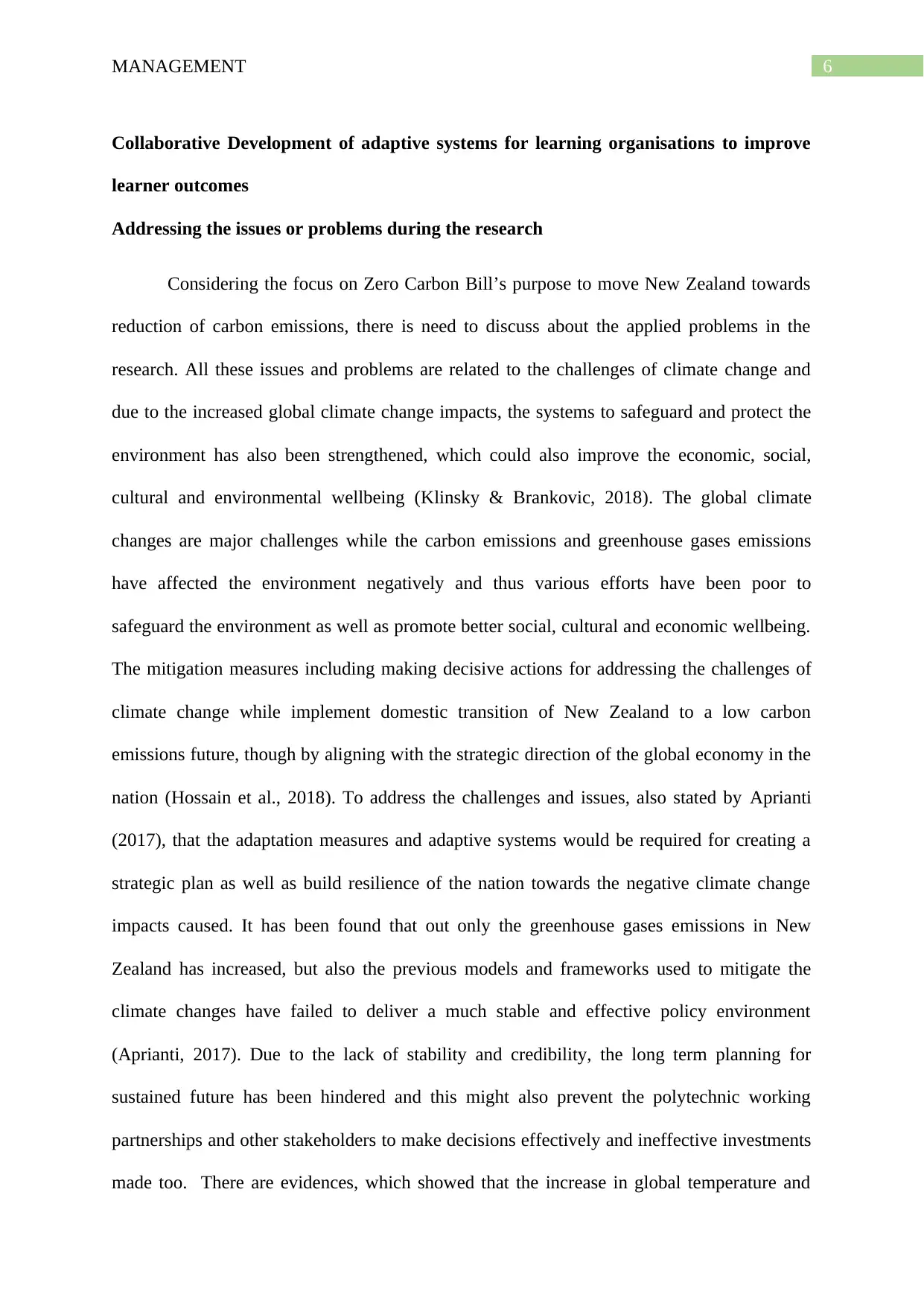
6MANAGEMENT
Collaborative Development of adaptive systems for learning organisations to improve
learner outcomes
Addressing the issues or problems during the research
Considering the focus on Zero Carbon Bill’s purpose to move New Zealand towards
reduction of carbon emissions, there is need to discuss about the applied problems in the
research. All these issues and problems are related to the challenges of climate change and
due to the increased global climate change impacts, the systems to safeguard and protect the
environment has also been strengthened, which could also improve the economic, social,
cultural and environmental wellbeing (Klinsky & Brankovic, 2018). The global climate
changes are major challenges while the carbon emissions and greenhouse gases emissions
have affected the environment negatively and thus various efforts have been poor to
safeguard the environment as well as promote better social, cultural and economic wellbeing.
The mitigation measures including making decisive actions for addressing the challenges of
climate change while implement domestic transition of New Zealand to a low carbon
emissions future, though by aligning with the strategic direction of the global economy in the
nation (Hossain et al., 2018). To address the challenges and issues, also stated by Aprianti
(2017), that the adaptation measures and adaptive systems would be required for creating a
strategic plan as well as build resilience of the nation towards the negative climate change
impacts caused. It has been found that out only the greenhouse gases emissions in New
Zealand has increased, but also the previous models and frameworks used to mitigate the
climate changes have failed to deliver a much stable and effective policy environment
(Aprianti, 2017). Due to the lack of stability and credibility, the long term planning for
sustained future has been hindered and this might also prevent the polytechnic working
partnerships and other stakeholders to make decisions effectively and ineffective investments
made too. There are evidences, which showed that the increase in global temperature and
Collaborative Development of adaptive systems for learning organisations to improve
learner outcomes
Addressing the issues or problems during the research
Considering the focus on Zero Carbon Bill’s purpose to move New Zealand towards
reduction of carbon emissions, there is need to discuss about the applied problems in the
research. All these issues and problems are related to the challenges of climate change and
due to the increased global climate change impacts, the systems to safeguard and protect the
environment has also been strengthened, which could also improve the economic, social,
cultural and environmental wellbeing (Klinsky & Brankovic, 2018). The global climate
changes are major challenges while the carbon emissions and greenhouse gases emissions
have affected the environment negatively and thus various efforts have been poor to
safeguard the environment as well as promote better social, cultural and economic wellbeing.
The mitigation measures including making decisive actions for addressing the challenges of
climate change while implement domestic transition of New Zealand to a low carbon
emissions future, though by aligning with the strategic direction of the global economy in the
nation (Hossain et al., 2018). To address the challenges and issues, also stated by Aprianti
(2017), that the adaptation measures and adaptive systems would be required for creating a
strategic plan as well as build resilience of the nation towards the negative climate change
impacts caused. It has been found that out only the greenhouse gases emissions in New
Zealand has increased, but also the previous models and frameworks used to mitigate the
climate changes have failed to deliver a much stable and effective policy environment
(Aprianti, 2017). Due to the lack of stability and credibility, the long term planning for
sustained future has been hindered and this might also prevent the polytechnic working
partnerships and other stakeholders to make decisions effectively and ineffective investments
made too. There are evidences, which showed that the increase in global temperature and
Paraphrase This Document
Need a fresh take? Get an instant paraphrase of this document with our AI Paraphraser
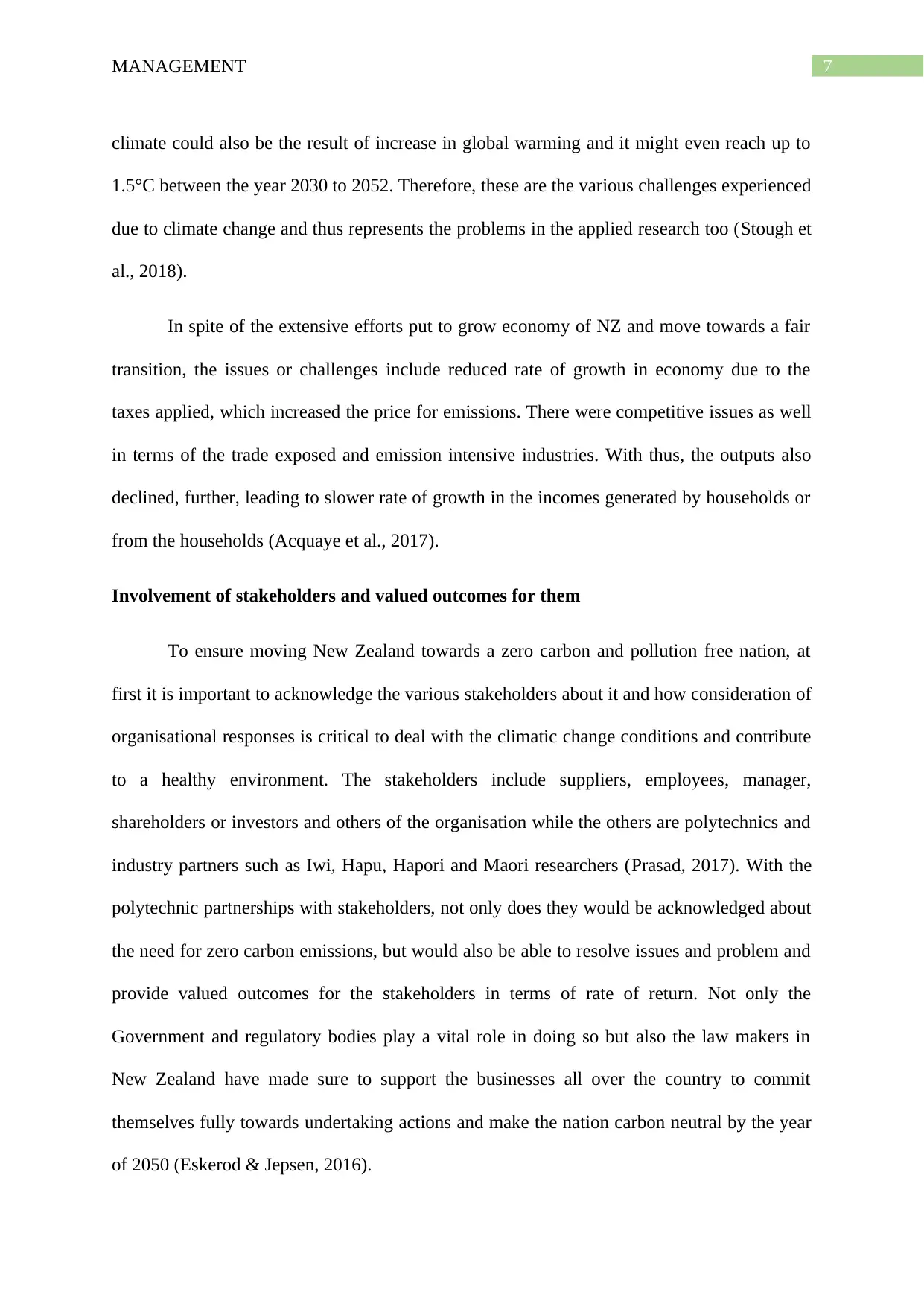
7MANAGEMENT
climate could also be the result of increase in global warming and it might even reach up to
1.5°C between the year 2030 to 2052. Therefore, these are the various challenges experienced
due to climate change and thus represents the problems in the applied research too (Stough et
al., 2018).
In spite of the extensive efforts put to grow economy of NZ and move towards a fair
transition, the issues or challenges include reduced rate of growth in economy due to the
taxes applied, which increased the price for emissions. There were competitive issues as well
in terms of the trade exposed and emission intensive industries. With thus, the outputs also
declined, further, leading to slower rate of growth in the incomes generated by households or
from the households (Acquaye et al., 2017).
Involvement of stakeholders and valued outcomes for them
To ensure moving New Zealand towards a zero carbon and pollution free nation, at
first it is important to acknowledge the various stakeholders about it and how consideration of
organisational responses is critical to deal with the climatic change conditions and contribute
to a healthy environment. The stakeholders include suppliers, employees, manager,
shareholders or investors and others of the organisation while the others are polytechnics and
industry partners such as Iwi, Hapu, Hapori and Maori researchers (Prasad, 2017). With the
polytechnic partnerships with stakeholders, not only does they would be acknowledged about
the need for zero carbon emissions, but would also be able to resolve issues and problem and
provide valued outcomes for the stakeholders in terms of rate of return. Not only the
Government and regulatory bodies play a vital role in doing so but also the law makers in
New Zealand have made sure to support the businesses all over the country to commit
themselves fully towards undertaking actions and make the nation carbon neutral by the year
of 2050 (Eskerod & Jepsen, 2016).
climate could also be the result of increase in global warming and it might even reach up to
1.5°C between the year 2030 to 2052. Therefore, these are the various challenges experienced
due to climate change and thus represents the problems in the applied research too (Stough et
al., 2018).
In spite of the extensive efforts put to grow economy of NZ and move towards a fair
transition, the issues or challenges include reduced rate of growth in economy due to the
taxes applied, which increased the price for emissions. There were competitive issues as well
in terms of the trade exposed and emission intensive industries. With thus, the outputs also
declined, further, leading to slower rate of growth in the incomes generated by households or
from the households (Acquaye et al., 2017).
Involvement of stakeholders and valued outcomes for them
To ensure moving New Zealand towards a zero carbon and pollution free nation, at
first it is important to acknowledge the various stakeholders about it and how consideration of
organisational responses is critical to deal with the climatic change conditions and contribute
to a healthy environment. The stakeholders include suppliers, employees, manager,
shareholders or investors and others of the organisation while the others are polytechnics and
industry partners such as Iwi, Hapu, Hapori and Maori researchers (Prasad, 2017). With the
polytechnic partnerships with stakeholders, not only does they would be acknowledged about
the need for zero carbon emissions, but would also be able to resolve issues and problem and
provide valued outcomes for the stakeholders in terms of rate of return. Not only the
Government and regulatory bodies play a vital role in doing so but also the law makers in
New Zealand have made sure to support the businesses all over the country to commit
themselves fully towards undertaking actions and make the nation carbon neutral by the year
of 2050 (Eskerod & Jepsen, 2016).
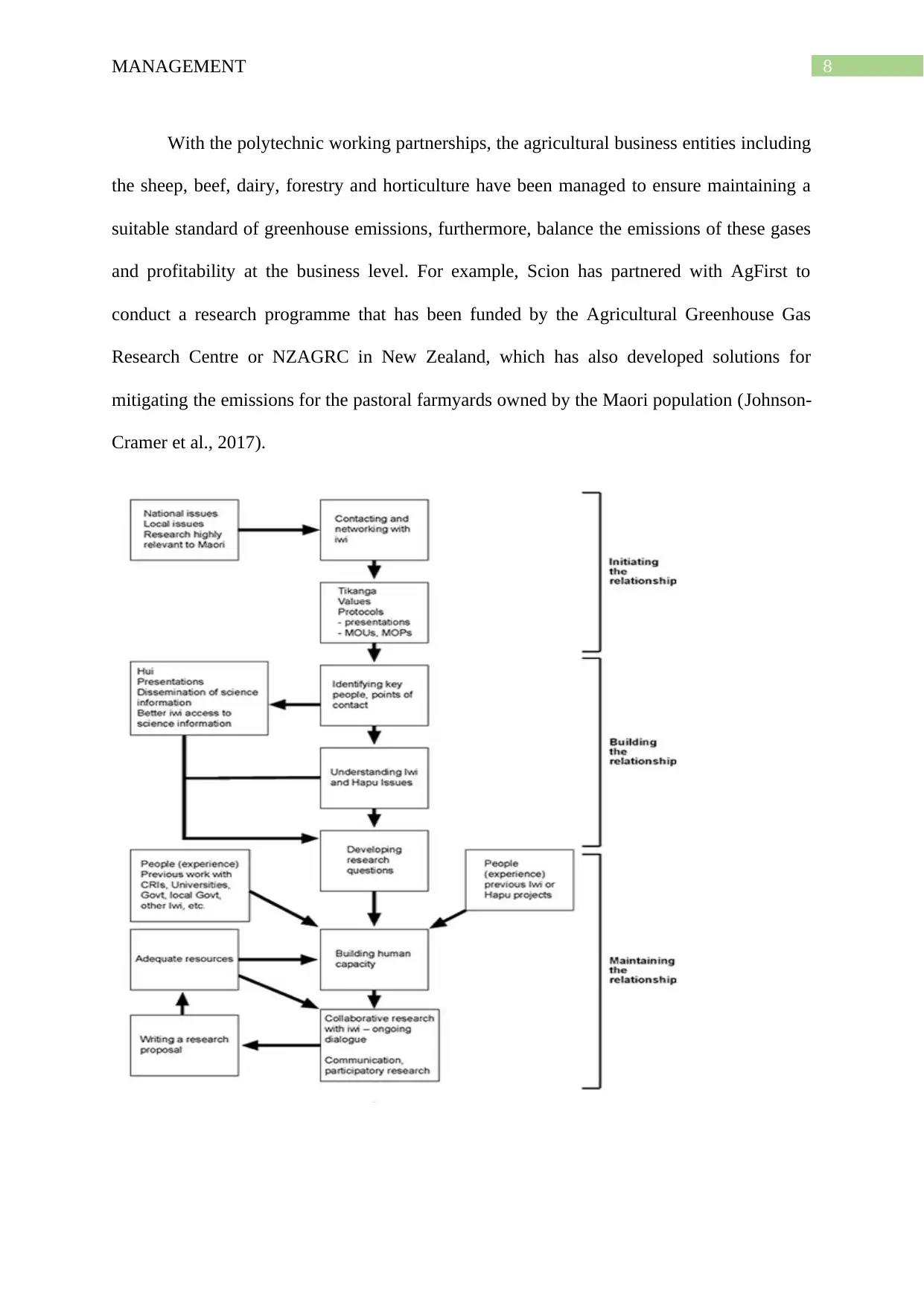
8MANAGEMENT
With the polytechnic working partnerships, the agricultural business entities including
the sheep, beef, dairy, forestry and horticulture have been managed to ensure maintaining a
suitable standard of greenhouse emissions, furthermore, balance the emissions of these gases
and profitability at the business level. For example, Scion has partnered with AgFirst to
conduct a research programme that has been funded by the Agricultural Greenhouse Gas
Research Centre or NZAGRC in New Zealand, which has also developed solutions for
mitigating the emissions for the pastoral farmyards owned by the Maori population (Johnson-
Cramer et al., 2017).
With the polytechnic working partnerships, the agricultural business entities including
the sheep, beef, dairy, forestry and horticulture have been managed to ensure maintaining a
suitable standard of greenhouse emissions, furthermore, balance the emissions of these gases
and profitability at the business level. For example, Scion has partnered with AgFirst to
conduct a research programme that has been funded by the Agricultural Greenhouse Gas
Research Centre or NZAGRC in New Zealand, which has also developed solutions for
mitigating the emissions for the pastoral farmyards owned by the Maori population (Johnson-
Cramer et al., 2017).
⊘ This is a preview!⊘
Do you want full access?
Subscribe today to unlock all pages.

Trusted by 1+ million students worldwide
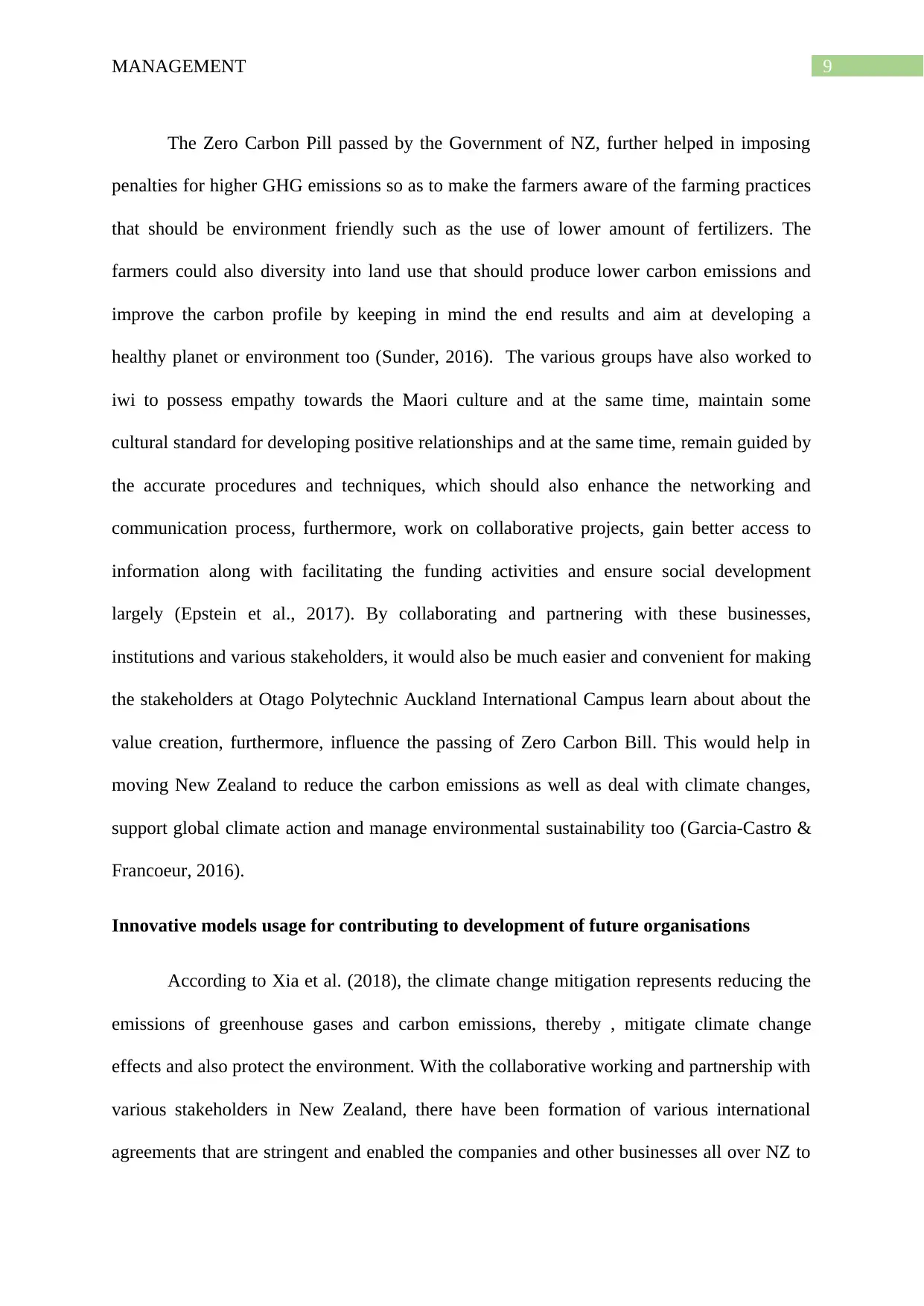
9MANAGEMENT
The Zero Carbon Pill passed by the Government of NZ, further helped in imposing
penalties for higher GHG emissions so as to make the farmers aware of the farming practices
that should be environment friendly such as the use of lower amount of fertilizers. The
farmers could also diversity into land use that should produce lower carbon emissions and
improve the carbon profile by keeping in mind the end results and aim at developing a
healthy planet or environment too (Sunder, 2016). The various groups have also worked to
iwi to possess empathy towards the Maori culture and at the same time, maintain some
cultural standard for developing positive relationships and at the same time, remain guided by
the accurate procedures and techniques, which should also enhance the networking and
communication process, furthermore, work on collaborative projects, gain better access to
information along with facilitating the funding activities and ensure social development
largely (Epstein et al., 2017). By collaborating and partnering with these businesses,
institutions and various stakeholders, it would also be much easier and convenient for making
the stakeholders at Otago Polytechnic Auckland International Campus learn about about the
value creation, furthermore, influence the passing of Zero Carbon Bill. This would help in
moving New Zealand to reduce the carbon emissions as well as deal with climate changes,
support global climate action and manage environmental sustainability too (Garcia‐Castro &
Francoeur, 2016).
Innovative models usage for contributing to development of future organisations
According to Xia et al. (2018), the climate change mitigation represents reducing the
emissions of greenhouse gases and carbon emissions, thereby , mitigate climate change
effects and also protect the environment. With the collaborative working and partnership with
various stakeholders in New Zealand, there have been formation of various international
agreements that are stringent and enabled the companies and other businesses all over NZ to
The Zero Carbon Pill passed by the Government of NZ, further helped in imposing
penalties for higher GHG emissions so as to make the farmers aware of the farming practices
that should be environment friendly such as the use of lower amount of fertilizers. The
farmers could also diversity into land use that should produce lower carbon emissions and
improve the carbon profile by keeping in mind the end results and aim at developing a
healthy planet or environment too (Sunder, 2016). The various groups have also worked to
iwi to possess empathy towards the Maori culture and at the same time, maintain some
cultural standard for developing positive relationships and at the same time, remain guided by
the accurate procedures and techniques, which should also enhance the networking and
communication process, furthermore, work on collaborative projects, gain better access to
information along with facilitating the funding activities and ensure social development
largely (Epstein et al., 2017). By collaborating and partnering with these businesses,
institutions and various stakeholders, it would also be much easier and convenient for making
the stakeholders at Otago Polytechnic Auckland International Campus learn about about the
value creation, furthermore, influence the passing of Zero Carbon Bill. This would help in
moving New Zealand to reduce the carbon emissions as well as deal with climate changes,
support global climate action and manage environmental sustainability too (Garcia‐Castro &
Francoeur, 2016).
Innovative models usage for contributing to development of future organisations
According to Xia et al. (2018), the climate change mitigation represents reducing the
emissions of greenhouse gases and carbon emissions, thereby , mitigate climate change
effects and also protect the environment. With the collaborative working and partnership with
various stakeholders in New Zealand, there have been formation of various international
agreements that are stringent and enabled the companies and other businesses all over NZ to
Paraphrase This Document
Need a fresh take? Get an instant paraphrase of this document with our AI Paraphraser
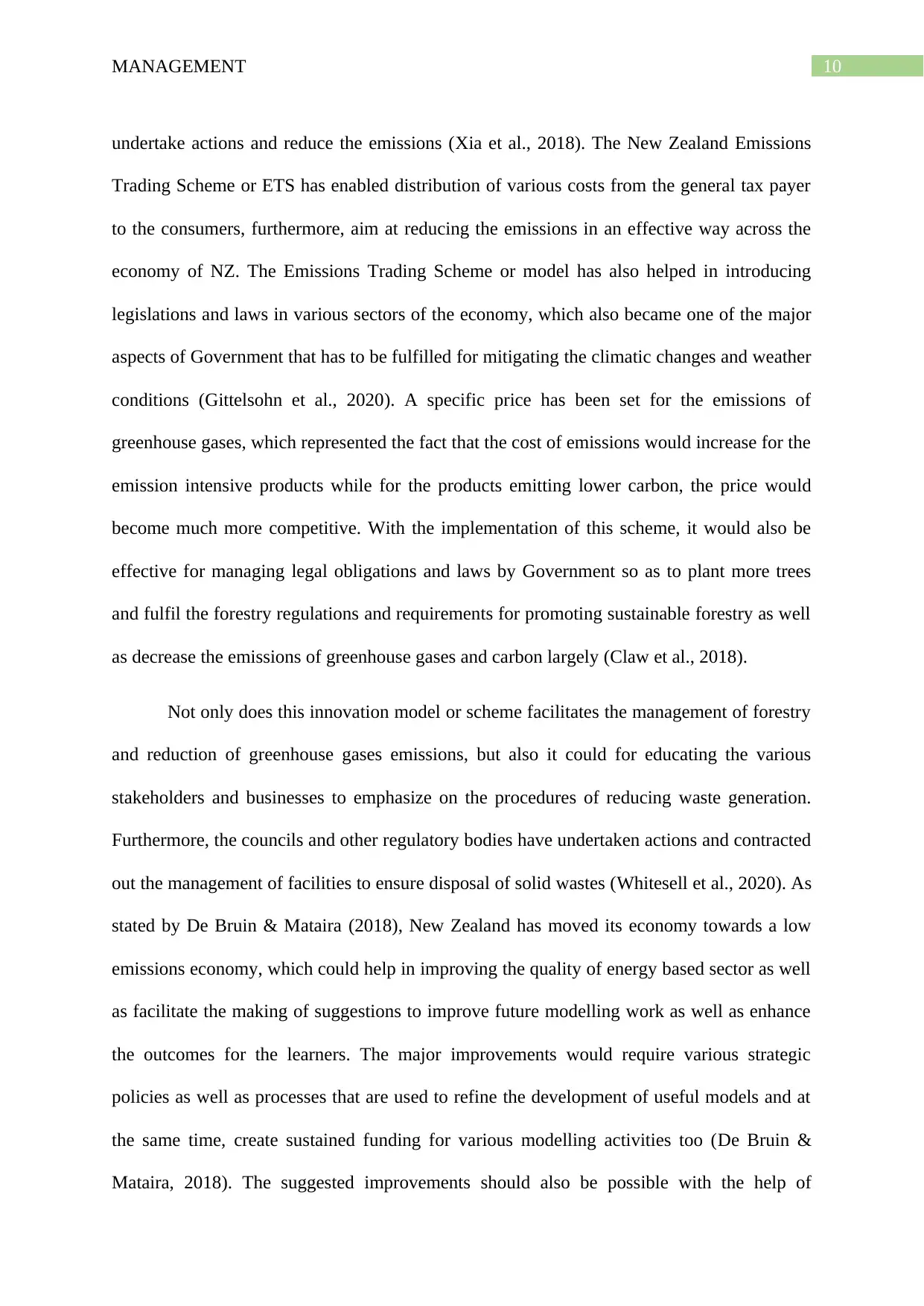
10MANAGEMENT
undertake actions and reduce the emissions (Xia et al., 2018). The New Zealand Emissions
Trading Scheme or ETS has enabled distribution of various costs from the general tax payer
to the consumers, furthermore, aim at reducing the emissions in an effective way across the
economy of NZ. The Emissions Trading Scheme or model has also helped in introducing
legislations and laws in various sectors of the economy, which also became one of the major
aspects of Government that has to be fulfilled for mitigating the climatic changes and weather
conditions (Gittelsohn et al., 2020). A specific price has been set for the emissions of
greenhouse gases, which represented the fact that the cost of emissions would increase for the
emission intensive products while for the products emitting lower carbon, the price would
become much more competitive. With the implementation of this scheme, it would also be
effective for managing legal obligations and laws by Government so as to plant more trees
and fulfil the forestry regulations and requirements for promoting sustainable forestry as well
as decrease the emissions of greenhouse gases and carbon largely (Claw et al., 2018).
Not only does this innovation model or scheme facilitates the management of forestry
and reduction of greenhouse gases emissions, but also it could for educating the various
stakeholders and businesses to emphasize on the procedures of reducing waste generation.
Furthermore, the councils and other regulatory bodies have undertaken actions and contracted
out the management of facilities to ensure disposal of solid wastes (Whitesell et al., 2020). As
stated by De Bruin & Mataira (2018), New Zealand has moved its economy towards a low
emissions economy, which could help in improving the quality of energy based sector as well
as facilitate the making of suggestions to improve future modelling work as well as enhance
the outcomes for the learners. The major improvements would require various strategic
policies as well as processes that are used to refine the development of useful models and at
the same time, create sustained funding for various modelling activities too (De Bruin &
Mataira, 2018). The suggested improvements should also be possible with the help of
undertake actions and reduce the emissions (Xia et al., 2018). The New Zealand Emissions
Trading Scheme or ETS has enabled distribution of various costs from the general tax payer
to the consumers, furthermore, aim at reducing the emissions in an effective way across the
economy of NZ. The Emissions Trading Scheme or model has also helped in introducing
legislations and laws in various sectors of the economy, which also became one of the major
aspects of Government that has to be fulfilled for mitigating the climatic changes and weather
conditions (Gittelsohn et al., 2020). A specific price has been set for the emissions of
greenhouse gases, which represented the fact that the cost of emissions would increase for the
emission intensive products while for the products emitting lower carbon, the price would
become much more competitive. With the implementation of this scheme, it would also be
effective for managing legal obligations and laws by Government so as to plant more trees
and fulfil the forestry regulations and requirements for promoting sustainable forestry as well
as decrease the emissions of greenhouse gases and carbon largely (Claw et al., 2018).
Not only does this innovation model or scheme facilitates the management of forestry
and reduction of greenhouse gases emissions, but also it could for educating the various
stakeholders and businesses to emphasize on the procedures of reducing waste generation.
Furthermore, the councils and other regulatory bodies have undertaken actions and contracted
out the management of facilities to ensure disposal of solid wastes (Whitesell et al., 2020). As
stated by De Bruin & Mataira (2018), New Zealand has moved its economy towards a low
emissions economy, which could help in improving the quality of energy based sector as well
as facilitate the making of suggestions to improve future modelling work as well as enhance
the outcomes for the learners. The major improvements would require various strategic
policies as well as processes that are used to refine the development of useful models and at
the same time, create sustained funding for various modelling activities too (De Bruin &
Mataira, 2018). The suggested improvements should also be possible with the help of
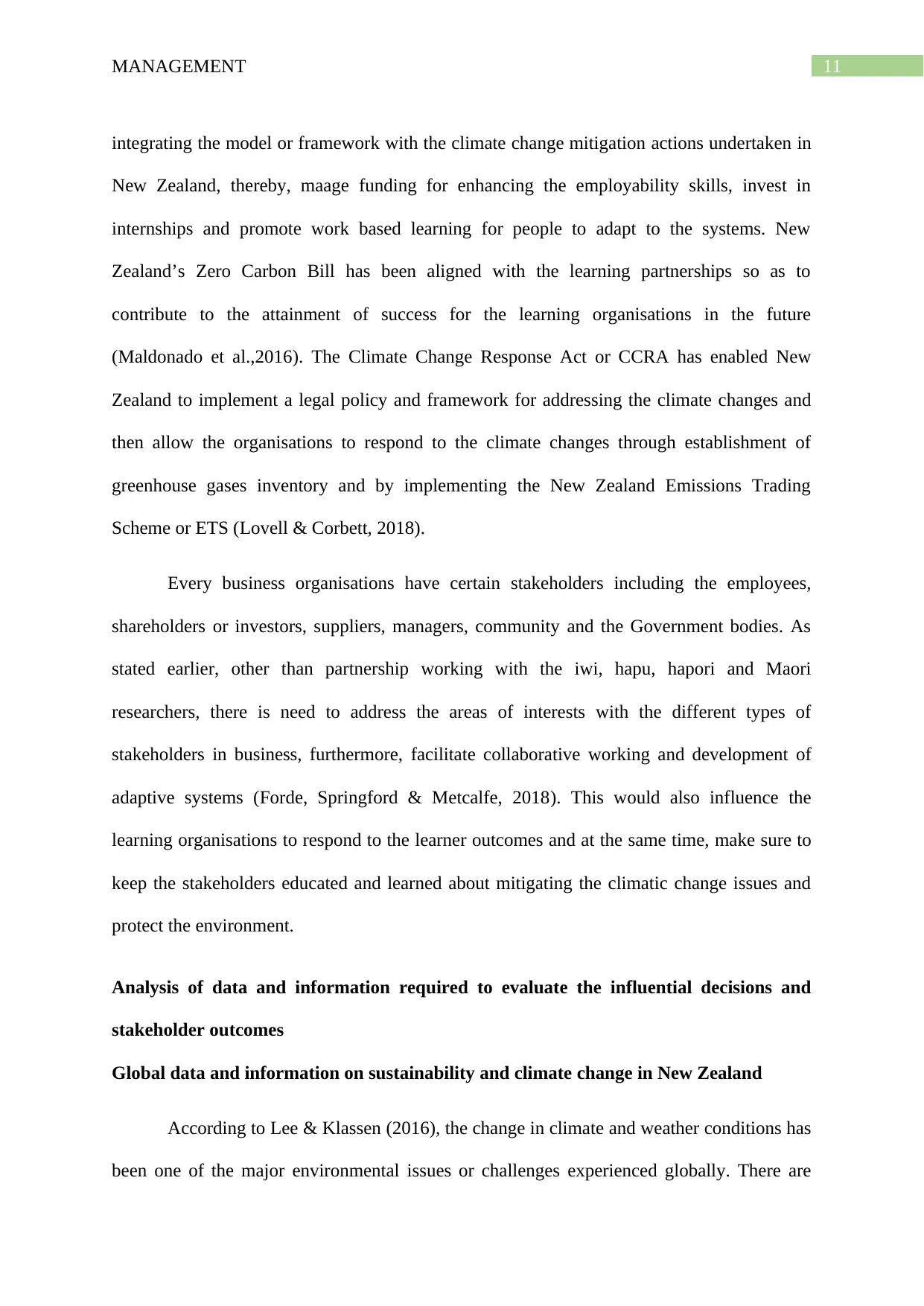
11MANAGEMENT
integrating the model or framework with the climate change mitigation actions undertaken in
New Zealand, thereby, maage funding for enhancing the employability skills, invest in
internships and promote work based learning for people to adapt to the systems. New
Zealand’s Zero Carbon Bill has been aligned with the learning partnerships so as to
contribute to the attainment of success for the learning organisations in the future
(Maldonado et al.,2016). The Climate Change Response Act or CCRA has enabled New
Zealand to implement a legal policy and framework for addressing the climate changes and
then allow the organisations to respond to the climate changes through establishment of
greenhouse gases inventory and by implementing the New Zealand Emissions Trading
Scheme or ETS (Lovell & Corbett, 2018).
Every business organisations have certain stakeholders including the employees,
shareholders or investors, suppliers, managers, community and the Government bodies. As
stated earlier, other than partnership working with the iwi, hapu, hapori and Maori
researchers, there is need to address the areas of interests with the different types of
stakeholders in business, furthermore, facilitate collaborative working and development of
adaptive systems (Forde, Springford & Metcalfe, 2018). This would also influence the
learning organisations to respond to the learner outcomes and at the same time, make sure to
keep the stakeholders educated and learned about mitigating the climatic change issues and
protect the environment.
Analysis of data and information required to evaluate the influential decisions and
stakeholder outcomes
Global data and information on sustainability and climate change in New Zealand
According to Lee & Klassen (2016), the change in climate and weather conditions has
been one of the major environmental issues or challenges experienced globally. There are
integrating the model or framework with the climate change mitigation actions undertaken in
New Zealand, thereby, maage funding for enhancing the employability skills, invest in
internships and promote work based learning for people to adapt to the systems. New
Zealand’s Zero Carbon Bill has been aligned with the learning partnerships so as to
contribute to the attainment of success for the learning organisations in the future
(Maldonado et al.,2016). The Climate Change Response Act or CCRA has enabled New
Zealand to implement a legal policy and framework for addressing the climate changes and
then allow the organisations to respond to the climate changes through establishment of
greenhouse gases inventory and by implementing the New Zealand Emissions Trading
Scheme or ETS (Lovell & Corbett, 2018).
Every business organisations have certain stakeholders including the employees,
shareholders or investors, suppliers, managers, community and the Government bodies. As
stated earlier, other than partnership working with the iwi, hapu, hapori and Maori
researchers, there is need to address the areas of interests with the different types of
stakeholders in business, furthermore, facilitate collaborative working and development of
adaptive systems (Forde, Springford & Metcalfe, 2018). This would also influence the
learning organisations to respond to the learner outcomes and at the same time, make sure to
keep the stakeholders educated and learned about mitigating the climatic change issues and
protect the environment.
Analysis of data and information required to evaluate the influential decisions and
stakeholder outcomes
Global data and information on sustainability and climate change in New Zealand
According to Lee & Klassen (2016), the change in climate and weather conditions has
been one of the major environmental issues or challenges experienced globally. There are
⊘ This is a preview!⊘
Do you want full access?
Subscribe today to unlock all pages.

Trusted by 1+ million students worldwide
1 out of 25
Your All-in-One AI-Powered Toolkit for Academic Success.
+13062052269
info@desklib.com
Available 24*7 on WhatsApp / Email
![[object Object]](/_next/static/media/star-bottom.7253800d.svg)
Unlock your academic potential
Copyright © 2020–2026 A2Z Services. All Rights Reserved. Developed and managed by ZUCOL.
